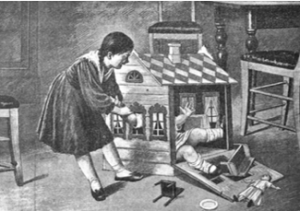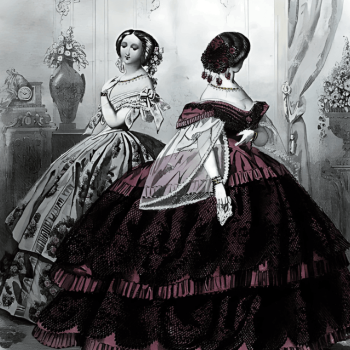WHAT HAPPENED IN THE DOLL HOUSE
January 1842.[1]
Winter skidded and covered all the fields and roads with snow. The garden became impassable. The trees stood shaggy, drooping with snow hanging on their branches. The surrounding farmsteads had nestled into the loose snow, and had it not been for their disheveled, bare gardens and the bluish haze in the mornings, the distant villages would have been impossible to distinguish. The windows and doors were caulked, and bright fire crackled in the stoves. Long evenings began, and the gray days flashed by so quickly that it was impossible for the girls to finish their lessons without candles. Colonel Hahn went to Kharkov before Christmas to buy presents for everyone, which he took to Helena Andreevna’s room in a box called “kitchen supplies.” Busy with their picture books, the girls paid no attention to this. In the evening, they were called into the living room, where they saw that everyone had gathered by the light of one candle, which Colonel Hahn blew out when they entered.
“What is this? Why is it so dark?” the girls asked.
“You’ll see!” answered Helena Andreevna.
“Do not move!” said Antonia, turning Vera by the shoulders. “Stand still and look straight ahead.”
The sisters froze motionless in complete silence. Vera opened her eyes to their full width, but she saw nothing.
Suddenly a rustling sound was heard, and some blue, smoking pattern ran like lightning across the dark wall.
“What is this?” they cried.
“Look! Look what a fiery pencil Mama has! What is she drawing!” Colonel Hahn’s cheerful voice rang out. A face with an aquiline nose and donkey ears quickly flashed on the wall. Then another picture, and a third. Under Helen Andreevna’s quick hand, patterns and drawings lit up like snakes.
“Read!” said Helena Andreevna.
And the girls read the brilliant, smoking, quickly extinguishing words: “Lelya and Vera are silly!”
“Do another one!” Lelya screamed with laughter, rushing to her mother. “Show me, Mamochka! What is this? What are you writing with?”
“With this,” said Helena Andreevna, striking harder on the wall, and lighting the first phosphorus match the girls had ever seen. Sulfur matches appeared in Russia in the early 1840s. Previously, fire was produced with flint.
“What kind of sticks are these? Why are they burning?”
Helena Andreevna explained what matches were to the girls, as well as their utility. “Now we needn’t run to the kitchen for fire,” she said, “for we will always have it at hand.”
Helena Andreevna lit a candle that stood on the piano. The girls continued standing still. With their mouths open in surprise, they looked at the flame of the candle, expecting that something extraordinary would happen to it; but seeing that it was burning like any other, they became upset and began to ask for more fiery drawings. “Little by little,” said Helena Andreevna. “This is a dangerous game, and so you must not try to repeat these experiments yourselves.” (She wisely hid the matches in her box.)
New Year’s Eve 1842 arrived. It was a boring, cloudy, sad evening. Almost from the very morning, the girls were all alone. Helena Andreevna told them that she was unwell and knowing that she often did not leave the bedroom when she was sick, they were not at all surprised that Antonia did not leave her side all day. Colonel Hahn made only a fleeting appearance. He arrived while Vera and Lelya were dining with Miss Jeffers. He hurriedly ate his borscht, looked at them through his glasses, smiled, pinched Vera on the cheek, joked with Lelya, and left, saying that he “had no time.” After lunch, Miss Jeffers also disappeared. Lelya and Vera sat quietly in a dimly lit room, remembering with hidden sighs about the holidays of the previous year. They thought about Baba Lena’s gifts and Gorov’s wonderful Christmas tree, and curious whether in Saratov they would make a Christmas tree without them or whether Nadya would be considered too big for this. Outside the window, in the yellow twilight, snowflakes flashed quickly in a dense grid. The wind was beginning to howl its melancholy night song in the chimneys. Vera was very scared, and a heavy feeling crept into her heart. Even the carefree, always cheerful Lelya calmed down.
Suddenly the door opened, and Annushka came in with Leonid in her arms. Behind her was her fat sister, Marya, their housekeeper and seamstress who was also the wife of Voronov (Colonel Hahn’s orderly.) They both sat down by the wall, smiling, looking first at the girls, then at the door, as if expecting something.
The door opened again and Masha, Helena Andreevna’s maid, came in cheerfully.
“Young ladies!” said Masha. “Go quickly! Mama is calling you!”
“Ah!” screamed Lelya, slapping herself on the forehead. “I know why!” Jumping out the door, she rushed to Helena Andreevna’s room.
Vera, of course, followed her, but only when she reached the threshold of the bedroom did she understand what was happening. A completely unexpected, decorated Christmas tree shined with lights in the middle of the room. There were toys beneath it, and around it stood Helena Andreevna, Antonia, Colonel Hahn, Miss Jeffers. Everyone was smiling, very pleased that after fiddling around with the Christmas tree all day, they had so skillfully deceived the girls.
For Vera, there was a large wooden doll’s house with three or four rooms, furnished and decorated very beautifully. Helena Andreevna and Colonel Hahn spent a whole week covering it and cleaning the living room, bedroom, and kitchen. Above it was a red roof, with pipes, and in the rooms, there were various dolls. Vera was especially interested in an Arab footman in a red jacket, who was serving tea on a tray to the lady sitting on the sofa. Helena Andreevna made this doll perfectly, embroidering him herself. The other dolls, made by Helena Andreevna and Antonina, were also very smartly dressed. Vera looked at them through the doors and windows, wondering how they could have been seated there when Colonel Hahn approached, lifted the roof a little, and lowered the entire front wall of the house, so that it immediately opened up from the top and main facade. Seeing such a wide entrance to her house, Leonid began to reach out to him and scream until he was seated in the main living room. The infant brother immediately began to rule so unceremoniously that he brought Vera to despair! (Helena Andreevna managed to get him out of there and amused him with some other toy.)
A few days later, entering the room where her dollhouse stood, Vera heard extraordinary noise and movement in it. Rushing towards it, Vera saw through the window that Leonid Petrovich was sitting there, legs crossed, with a pencil in his hands, and with all his might he was painting the floor, ceiling, and walls, sparing neither paintings nor wallpaper. “Who put him there and closed the board behind him?” she thought.

“What Happened In The Doll House.”[2]
Having seen Leonid’s atrocities in her front hall, Vera became so furious that she completely forgot about the opening wall. Grabbing Leonid by his hand through one of the windows, she tried pulling him out of the dollhouse, thus dragging the entire miniature estate throughout the room. Everyone in the whole household came running to the scream, tears, and noise. Vera, all red and exhausted, continued to drag Leonid by the hand, losing her temper that she could not pull him through the tiny window of the doll’s house. Leonid, unfortunate, overturned inside his cramped room, with his arm stretched out almost to the point of dislocation, beat against the walls of her hall, and screamed with all his might. Having difficulty understanding what the matter was, the grownups separated them and, taking Leonid out of the doll room he had badly damaged, quelled his screams and pacified both children.
“Verochka! What has come over you?” Helena Andreevna said with surprise. “Naughty girl! I didn’t expect such childishness and anger from you!”
Vera, likewise, could not understand how this happened. How could she, such a “prudent” girl, be so angry with her little brother? When she saw the unhappy face of the poor exhausted baby (who had not stopped sobbing pitifully for a long time,) with his red little hand, bruises on his forehead, and swollen cheeks, wet from tears, she felt very ashamed and sorry for her brother; but she immediately tried to hide these good feelings.
“Allez dans vôtre chambre, mauvaise petite fille!” Antonia told her angrily.[3] “Maltraiter ainsi son petit frère, pour un joujou!”[4]
“Yes!” Vera grumbled, looking at Antonia from under her brows. “Why did he ruin my house?”
“Why is that important?! Is your toy more valuable to you than your brother? Go to your room now and don’t you dare come out! I don’t want to see you!”
Vera went to her room with a bitter feeling in her heart, trying her best to hold back her tears so as not to show her weakness. “It’s better for everyone to think that I don’t care and don’t feel sorry for Leonid at all!” she thought angrily. She tried to give her face the most angry, mocking expression and sat down in her room by the window. She soon became very bored. At first, she sulked and, finally, unable to control herself, she cried bitterly.
“Voilà qui est bien mieux que de bouder!” Antonia remarked to me in passing.[5] “It’s much better to cry than to be angry.”
Vera burst into tears even more, and suddenly it seemed to her that she was so poor, so unhappy, that there was no other bitter girl like her in the world! “They offended me, they punished me, and they rejoice at my tears!” she thought. “Okay! Let them rejoice, I will cry. I will cry so much that I will get sick! Let them then rejoice at my illness. I may get so sick that I will even die! Then they will all know how unhappy I was. They will all gather around me and will feel sorry, and remember, and cry! They will praise me and repent.” These thoughts made her cry harder and harder. She imagined her own funeral and the grief of her poor mother, and everyone’s surprise and pity, not so much about her death, but about everything that she endured, how she suffered, offended by everyone!
This whole tragedy presented itself to her so vividly that she could not bear it and, sobbing, expressed her sorrowful future in incoherent words. “Good!” she muttered. “Scold me! Perhaps you will repent when it’s too late.
“It’s not us, but you who need to repent, naughty girl!” objected Antonia calmly while sewing a stocking.
Her hard-heartedness completely outraged Vera.
“C’est bien!” Vera repeated.[6] In a threatening and at the same time mysterious voice, she added: “Perhaps, I will soon die, and you will not say this!”
To Vera’s great indignation, Antonia laughed.
“When will you die? Well, let’s hope that before then you still have time to improve! People don’t die from anger, my friend. If you died now, so evil, it would be very bad for you! Evil children, believe me, are not loved by either people or God.”
“God sees that I am not evil, but unhappy!” Vera objected with conviction.”
“Indeed?” said Antonia, laughing again. “Because you almost twisted your brother’s arms out of anger?” Antonia suddenly looked at Vera sternly and, changing her tone, spoke very seriously. “You should be ashamed of yourself! I thought you were a smart and kind girl, but suddenly you do and say such stupid and evil things! This is shameful and sinful. You better thank God that everything turned out well. You could have killed your poor baby brother. Then you would be really unhappy! Unhappy for life! Thank God that we came running in time! And now, instead of trying to make amends for your behavior, you still continue to get angry and invent nonsense? Unhappy children are not like you, my friend. They don’t dare to get angry or grumble over hurting someone like you just hurt Leonid—On the contrary, everyone hurts them and beats them with impunity.”
Antonia fell silent, thinking about something.
Vera also became quiet, feeling that she was right.
“You have a Mother and relatives. Everyone loves you and takes care of you,” Antonia said a minute later. “How are you unhappy? There are such unfortunate children in the world who never see affection and are happy when they are not offended. I don’t consider myself particularly unhappy, but I suffered so much when I was your age! God forbid you see half as much grief. For seven years I waited on everyone in my house, and my head hurt all day long from the punches and kicks. I did not even dare to cry, let alone complain!”
“Who could stop you?” asked Vera, as if completely indifferent, but in fact very interested.
“The belief that if I dared complain, I would be beaten even more.”
“Who dared to beat you? Was your mother so evil?”
“I didn’t have a mother. That was my greatest misfortune!”
“And your father? Where was your father?”
“My father was always ill and too busy with work to know what was going on in the family. And my stepmother couldn’t stand me.”
“These stepmothers are always as evil as witches!”
“No, this is nonsense! You’ve read about this in fairy tales; and stepmothers are very good, kind women. My grief was that my stepmother was a rude woman, almost a peasant; she considered love for her children the most terrible pampering, but she could not forgive me that my father loved me equally with her children.”
“He does not seem to have loved you so well!” Vera exclaimed indignantly. “What kind of love is this when he allowed you to be insulted like that?”
“He didn’t know that. In front of him, my stepmother held back and tried to be fairer. And I was so afraid of her and pitied my father that I never wanted to tell him. When he died, I felt even worse! I was completely turned into a maid. They dressed me in such dirty rags that I felt ashamed and disgusted with myself, and in the winter I was freezing from the cold. I had to bring water from the well every morning for the whole house. This was the hardest work for me in the winter, until I got used to it, because I never had shoes, except for my sister’s old ones, which could barely fit me because she was three years younger than me. In the mornings, I used to run as fast as I could through the snow or frozen mud across the yard to get water; and at the well, while the water filled up, I jumped from one foot to the other, because the frost burned my heels like fire. I came running with a bucket, all blue, shaking. Then I swept the rooms, tidied everything up, got my sisters and brothers dressed, helped them wash, and gave them tea. Then again, my stepmother would send me to run out into the cold, get some water, or go to the store for something.”
“What about tea?” Vera interrupted.
“Well, sometimes they gave it to me; only I had little time to think about it, because there was a lot to do. One of my sisters would need something; then my brothers screamed and called to me for help. Besides me, we had only one old, half-blind cook. She loved me and pitied me, but she couldn’t help me in any way, except that she sometimes filled the water for me.”
“If I were you, I would beat all these sisters and brothers of yours!” Vera remarked angrily, making a gesture as if she was pinching someone firmly, with special pleasure.
“That would be nice!” Antonia objected. “But how are they to blame, they were just poor children? They themselves suffered a lot from our poverty and from the rudeness of their mother.”
“Vilaine diablesse!” Vera cried, unable to control her indignation.[7]
Antonia smiled. “Quel vilain mot!” she said.[8] “Où l’avez-vous entendu?[9] There is no need to say bad words, especially since they never help anything.”
“Where are they all now?”
“My stepmother and sisters, and one brother died, all in one month, from cholera. And my younger brother lives with my older brother, a doctor in St. Petersburg, and studies there.”
“But why did you once say that you have no relatives? Is there a brother?”
“Yes, but I hardly know him. I only saw him two or three times at the institute.”
“Who sent you to college?”
“I do not know myself!” laughed Antonia. “Lord God is right!”
“How is this the work of Lord God? How is this possible? Tell me, please!” pestered Vera, completely forgetting her grief and tears.
“Ma cher amie,” answered Antonia, “it’s a long and sad story! I’d better tell it to you another time.”[10]
Vera began to ask and beg her not to put it off, but to tell her everything, right away. Antonia could not refuse her, so she put away her sewing and Vera sat down on her favorite place on the bench at her feet. That evening she told Vera her whole story.[11]
-
- MOTHERS & DAUGHTERS
- A LANTERN
- CHRISTENING OF THE DOLL
- DASHA & DUNYA
- GRUNYA
- NANNY NASTYA
- NANNY’S FAIRYTALE
- CONFESSION
- IN THE MONASTERY
- PREPARATIONS FOR THE HOLIDAY
- EASTER
- THE DACHA
- THE MELON POND
- MIKHAIL IVANOVICH
- THE WARLIKE PARTRIDGE
- LEONID
- NEW WINTER
- HISTORY OF BELYANKA
- THEATRES AND BALLS
- YOLKA
- REASONING
- ROAD
- CAMP
- IN NEW PLACES
- THE GRAY MONK
- VARENIKI
- THE TRIP TO DIKANKA
- WHAT HAPPENED IN THE DOLL HOUSE
- ANTONIA’S STORY
- “A WINTER EVENING”
- THE BLACK SEA
- CRIME AND PUNISHMENT
- PANIKHIDA
- PRINCE TYUMEN
SOURCES:
[1] Fadeev writes: “I left for Petersburg on January 8, 1842. On the way, he stopped in Kirsanovsky District, Tambov province, to see the landowner Nikolai Ivanovich Krivtsov, whom he had met shortly before while he was on business in Saratov […] After a good rest from the bad road and weather and a very cordial reception at Krivtsov’s, I set out on my further journey on March 11, via Tambov and Moscow, and arrived in Petersburg on the 20th. After meeting with my brother, my first visit was, of course, to Perovsky, who received me neither warmly nor coldly, with the usual official phrases. I found a more pleasant reception at Count Kiselev, who received me in a friendly manner. When I thanked him for recommending me to the Emperor for appointment as Governor and added that I was extremely at a loss in this new field, for which I had never prepared myself and where, with all the best intentions, I could make mistakes and blunders, the Count objected to me: ‘Never mind, à force cue forger on deviant forgeron!’[…] Then I began to travel with obligatory visits to many noble persons and the ruling authorities of the then Petersburg world, among others, to my former boss Count Bludov, who received me very kindly and with great compliments: to Prince Vasilchikov, to Counts Panin, Kankrin, Benckendorff, Stroganov, etc. I was received by everyone, as usual, very cordially, but by Panin—with his usual arrogance. More than anyone else I liked the old Count Stroganov, Grigory Alexandrovich, the father of the current tutor of the Heir, and also the former Novorossiysk Governor-General […] I also had the opportunity to see often, first on business and assignments of our bishop Jacob, and then by an established acquaintance, the Moscow Metropolitan Philaret, who was in Petersburg at the time. Conversations with this worthy hierarch and remarkably intelligent man always gave me great pleasure. In addition to the persons named, with my arrival in Petersburg, the circle of my official acquaintances was further increased by the addition of all the Saratov landowners living in the capital, who fawned on me as the head of the province. The most outstanding of them were: Count Guryev, Lev Alexandrovich Naryshkin, Kologrivov and the old lady Likhacheva. At Naryshkin’s I met his sister, Countess Vorontsova-Dashkova, who involuntarily attracted attention with her unusually intelligent, expressive face, sung by our poet Lermontov in his famous poem for the “Portrait.” Likhacheva personified with her personality the real type of our old lively ladies, who spent their entire lives among the court and the nobility. Many were afraid of her because of her sharp tongue and persistence, but her company, especially her stories about the good old times, were very interesting and entertaining, as was the case with Praskovya Yuryevna Kologrivova, nee Princess Trubetskaya, but the first husband of Princess Gagarina, an old acquaintance of mine from Penza […] On the first of February I was summoned to the Emperor. I presented myself alone and was led into the study; there was no one else there except the Emperor and myself. His Majesty spoke with me for about half an hour. The entire conversation consisted, as usual in such cases, almost entirely of questions, rather short and abrupt, and my answers, in the same vein. I was warned not to dwell on the details in my answers, but that they should be brief and positive. The Emperor’s questions and remarks related, of course, exclusively to the city of Saratov and the Saratov province and, as far as I remember, roughly amounted to the following: what is the state of the province, what is the route and roads; will the lack of snow harm the grain; is the people’s food supply assured; what is the nobility like; are the elections conducted impartially; who is the provincial leader; is anything being undertaken to improve and organize the city of Saratov; about its water supply; about the schismatics and the Trans-Volga districts, and with the suggestion that the schism should not be allowed to spread in the districts. The Emperor finished by announcing to me his intention to visit Saratov without fail, and if possible, this very year. Then, two days later, Kiselev told me that the Emperor had spoken to him about me, and that I had had the good fortune to please His Majesty, that he was very pleased with his conversation with me, which he also conveyed to Perovsky. Of course, I was pleased to hear the Emperor’s gracious opinion of me, but from the essence of our conversation, it seems, it was impossible to conclude either good or bad about me.” [Fadeyev, Andrei Mikhailovich. Vospominaniia: 1790-1867. Vysochaishe Utverzhd. Yuzhno-Russkago. Odessa, Ukraine. [Russian Empire.] (1897): Part I: 162-166.]
[2] Zhelihovskaya, Vera Petrovna. How I Was Little. A. F. Devrien. St. Petersburg, Russia. (1898): 223.
[3] [Fr. “Go to your room, you bad girl!”]
[4] [Fr. “It’s cruel to treat your little brother like this because of a toy!”]
[5] [Fr. “This is much better than sulking!”]
[6] [Fr. “This is good!”]
[7] [Fr. “Ugly devil!”]
[8] [Fr. “What a nasty word!”]
[9] [Fr. “Where did you hear that?”]
[10] [Fr. “My dear friend.”]
[11] Zhelihovskaya, Vera Petrovna. How I Was Little. A. F. Devrien. St. Petersburg, Russia. (1898): 215-232.













